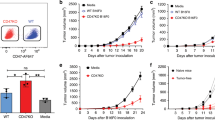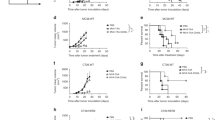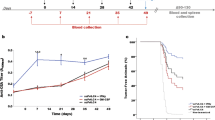Abstract
Dendritic cells (dc) are potent antigen-presenting cells that play a critical role in the initiation of cellular immune responses. Using a BALB/c syngeneic colon carcinoma cell line expressing a model tumor antigen β-galactosidase (βgal), we previously reported (Song et al, J Exp Med 1997; 186: 1247–1256) that immunization of mice with a single injection of DCs genetically modified with an adenovirus vector expressing βgal confers potent protection against a lethal intravenous tumor challenge, as well as suppression of pre-established lung tumors, resulting in a significant survival advantage. In the present study, we have addressed the question: how long does the memory of tumor antigen-specific immunity persists after DC priming in vivo using this genetically modified DC-based cancer vaccination strategy? To accomplish this, two groups of mice were evaluated: (1) mice surviving >400 days following protection from an initial intravenous tumor challenge after immunization with DC genetically modified to express βgal; and (2) mice surviving >300 days that had previously demonstrated regression of pre-established lung tumors after treatment with DC immunization. By analyzing the antigen-specific cytotoxic T lymphocyte response and challenging these long-term survival mice with a second subcutaneous tumor administration, the data demonstrate that a single administration of DC genetically modified to express a model antigen induces long-lasting, antigen-specific antitumor immunity in both naive and tumor-bearing hosts, observations that have important implications in the development of genetically modified DC-based antitumor vaccination strategies.
This is a preview of subscription content, access via your institution
Access options
Subscribe to this journal
Receive 12 print issues and online access
$259.00 per year
only $21.58 per issue
Buy this article
- Purchase on Springer Link
- Instant access to full article PDF
Prices may be subject to local taxes which are calculated during checkout



Similar content being viewed by others
References
Pardoll DM . Cancer vaccines Immunol Today 1993 14: 310–316
Houghton AN . Cancer antigens: immune recognition of self and altered self J Exp Med 1994 180: 1–4
Boon T, van der Bruggen P . Human tumor antigens recognized by T lymphocytes J Exp Med 1996 183: 725–729
Steinman RM . The dendritic cell system and its role in immunogenicity Annu Rev Immunol 1991 9: 271–296
Grabbe S, Beissert S, Schwarz T, Granstein RD . Dendritic cells as initiators of tumor immune responses: a possible strategy for tumor immunotherapy? Immunol Today 1995 16: 117–121
Young JW, Inaba K . Dendritic cells as adjuvants for class I major histocompatibility complex-restricted antitumor immunity J Exp Med 1996 183: 7–11
Schuler G, Steinman RM . Dendritic cells as adjuvants for immune-mediated resistance to tumors J Exp Med 1997 186: 1183–1187
Banchereau J, Steinman RM . Dendritic cells and the control of immunity Nature 1998 392: 245–252
Crystal RG . Transfer of genes to humans: early lessons and obstacles to success Science 1995 270: 404–410
Verma IM, Somia N . Gene therapy – promises, problems and prospects Nature 1997 389: 239–242
Mayordomo JI et al. Bone marrow-derived dendritic cells pulsed with synthetic tumour peptides elicit protective and therapeutic antitumour immunity Nature Med 1995 1: 1297–1302
Boczkowski D, Nair SK, Snyder D, Gilboa E . Dendritic cells pulsed with RNA are potent antigen-presenting cells in vitro and in vivo J Exp Med 1996 184: 465–472
Celluzzi CM et al. Peptide-pulsed dendritic cells induce antigen-specific, CTL-mediated protective tumor immunity J Exp Med 1996 183: 283–287
Hsu FJ et al. Vaccination of patients with B-cell lymphoma using autologous antigen-pulsed dendritic cells Nature Med 1996 2: 52–58
Porgador A, Snyder D, Gilboa E . Induction of antitumor immunity using bone marrow-generated dendritic cells J Immunol 1996 156: 2918–2926
Zitvogel L et al. Therapy of murine tumors with tumor peptide-pulsed dendritic cells: dependence on T cells, B7 costimulation, and T helper cell 1-associated cytokines J Exp Med 1996 183: 87–97
Nestle FO et al. Vaccination of melanoma patients with peptide- or tumor lysate-pulsed dendritic cells Nature Med 1998 4: 328–332
Henderson RA et al. Human dendritic cells genetically engineered to express high levels of the human epithelial tumor antigen mucin (MUC-1) Cancer Res 1996 56: 3763–3770
Reeves ME et al. Retroviral transduction of human dendritic cells with a tumor-associated antigen gene Cancer Res 1996 56: 5672–5677
Song W et al. Dendritic cells genetically modified with an adenovirus vector encoding the cDNA for a model antigen induce protective and therapeutic antitumor immunity J Exp Med 1997 186: 1247–1256
Brossart P et al. Virus-mediated delivery of antigenic epitopes into dendritic cells as a means to induce CTL J Immunol 1997 158: 3270–3276
Ribas A et al. Genetic immunization for the melanoma antigen MART-1/Melan-A using recombinant adenovirus-transduced murine dendritic cells Cancer Res 1997 57: 2865–2869
Specht JM et al. Dendritic cells retrovirally transduced with a model antigen gene are therapeutically effective against established pulmonary metastases J Exp Med 1997 186: 1213–1221
Wan Y et al. Dendritic cells transduced with an adenoviral vector encoding a model tumor-associated antigen for tumor vaccination Hum Gene Ther 1997 8: 1355–1363
Albert ML, Sauter B, Bhardwaj N . Dendritic cells acquire antigen from apoptotic cells and induce class I-restricted CTL Nature 1998 392: 86–89
Celluzzi CM, Falo LD Jr . Physical interaction between dendritic cells and tumor cells results in an immunogen that induces protective and therapeutic tumor rejection J Immunol 1998 160: 3081–3085
Uyttenhove C, Maryanski J, Boon T . Escape of mouse mastocytoma P815 after nearly complete rejection is due to antigen-loss variants rather than immunosuppression J Exp Med 1983 157: 1040–1052
Lurquin C et al. Structure of the gene of tum− transplantation antigen P91A: the mutated exon encodes a peptide recognized with Ld by cytolytic T cells Cell 1989 58: 293–303
Lehmann F et al. Differences in the antigens recognized by cytolytic T cells on two successive metastases of a melanoma patient are consistent with immune selection Eur J Immunol 1995 25: 340–347
Maeurer MJ et al. Tumor escape from immune recognition. Lethal recurrent melanoma in a patient associated with downregulation of the peptide transporter protein TAP-1 and loss of expression of the immunodominant MART-1/Melan-A antigen J Clin Invest 1996 98: 1633–1641
Bevan MJ . Antigen presentation to cytotoxic T lymphocytes in vivo J Exp Med 1995 182: 639–641
Germain RN . MHC-dependent antigen processing and peptide presentation: providing ligands for T lymphocyte activation Cell 1994 76: 287–299
Huang AY et al. Role of bone marrow-derived cells in presenting MHC class I-restricted tumor antigens Science 1994 264: 961–965
Wang M et al. Active immunotherapy of cancer with a nonreplicating recombinant fowlpox virus encoding a model tumor-associated antigen J Immunol 1995 154: 4685–4692
Rawle FC et al. Specificity of the mouse cytotoxic T lymphocyte response to adenovirus 5. E1a is immunodominant in H-2b, but not in H-2d or H-2k mice J Immunol 1991 146: 3977–3984
Inaba K et al. Generation of large numbers of dendritic cells from mouse bone marrow cultures supplemented with granulocyte/macrophage colony-stimulating factor J Exp Med 1992 176: 1693–1702
Rosenfeld MA et al. Adenovirus-mediated transfer of a recombinant alpha 1-antitrypsin gene to the lung epithelium in vivo Science 1991 252: 431–434
Rosenfeld MA et al. In vivo transfer of the human cystic fibrosis transmembrane conductance regulator gene to the airway epithelium Cell 1992 68: 143–155
Hersh J, Crystal RG, Bewig B . Modulation of gene expression after replication-deficient, recombinant adenovirus-mediated gene transfer by the product of a second adenovirus vector Gene Therapy 1995 2: 124–131
Crystal RG et al. Administration of an adenovirus containing the human CFTR cDNA to the respiratory tract of individuals with cystic fibrosis Nat Genet 1994 8: 42–51
Gavin MA et al. Alkali hydrolysis of recombinant proteins allows for the rapid identification of class I MHC-restricted CTL epitopes J Immunol 1993 151: 3971–3980
Mack CA et al. Circumvention of anti-adenovirus neutralizing immunity by administration of an adenoviral vector of an alternate serotype Hum Gene Ther 1997 8: 99–109
Song W, Kong H-L, Traktman P, Crystal RG . Cytotoxic T lymphocyte responses to proteins encoded by heterologous transgenes transferred in vivo by adenoviral vectors Hum Gene Ther 1997 8: 823–833
Kong HL et al. Regional suppression of tumor growth by in vivo transfer of a cDNA encoding a secreted form of the extracellular domain of the flt-1 vascular endothelial growth factor receptor Hum Gene Ther 1998 9: 823–833
Peto R et al. Design and analysis of randomized clinical trials requiring prolonged observation of each patient. II. Analysis and examples Br J Cancer 1977 35: 1–39
Acknowledgements
We thank N Mohamed in helping to prepare this manuscript. These studies were supported, in part, by the National Cancer Institute R01 CA75192; Will Rogers Memorial Fund, Los Angeles, CA; and GenVec, Inc., Rockville, MD.
Author information
Authors and Affiliations
Rights and permissions
About this article
Cite this article
Song, W., Tong, Y., Carpenter, H. et al. Persistent, antigen-specific, therapeutic antitumor immunity by dendritic cells genetically modified with an adenoviral vector to express a model tumor antigen. Gene Ther 7, 2080–2086 (2000). https://doi.org/10.1038/sj.gt.3301336
Received:
Accepted:
Published:
Issue Date:
DOI: https://doi.org/10.1038/sj.gt.3301336
Keywords
This article is cited by
-
Pre-clinical characterization of GMP grade CCL21-gene modified dendritic cells for application in a phase I trial in Non-Small Cell Lung Cancer
Journal of Translational Medicine (2008)
-
Engineered lentivector targeting of dendritic cells for in vivo immunization
Nature Biotechnology (2008)
-
Priming of T cells with aAd-transduced DC followed by expansion with peptide-pulsed DC significantly enhances the induction of tumor-specific CD8+ T cells: implications for an efficient vaccination strategy
Gene Therapy (2003)
-
Efficient genetic modification of murine dendritic cells by electroporation with mRNA
Cancer Gene Therapy (2002)



